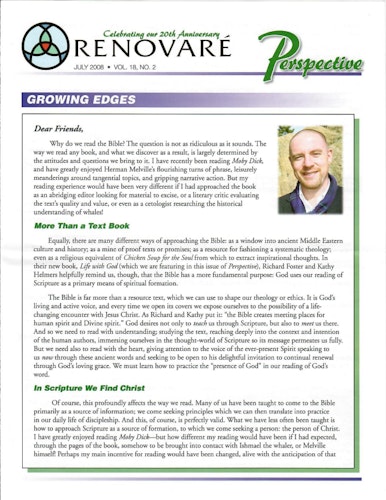Dear Friends,
Why do we read the Bible? The question is not as ridiculous as it sounds. The way we read any book, and what we discover as a result, is largely determined by the attitudes and questions we bring to it. I have recently been reading Moby Dick, and have greatly enjoyed Herman Melville’s flourishing turns of phrase, leisurely meanderings around tangential topics, and gripping narrative action. But my reading experience would have been very different if I had approached the book as an abridging editor looking for material to excise, or a literary critic evaluating the text’s quality and value, or even as a cetologist researching the historical understanding of whales!
More Than a Text Book
Equally, there are many different ways of approaching the Bible: as a window into ancient Middle Eastern culture and history; as a mine of proof texts or promises; as a resource for fashioning a systematic theology; even as a religious equivalent of Chicken Soup for the Soul from which to extract inspirational thoughts. In their new book, Life with God (which we are featuring in this issue of Perspective), Richard Foster and Kathy Helmers helpfully remind us, though, that the Bible has a more fundamental purpose: God uses our reading of Scripture as a primary means of spiritual formation.
The Bible is far more than a resource text, which we can use to shape our theology or ethics. It is God’s living and active voice, and every time we open its covers we expose ourselves to the possibility of a life changing encounter with Jesus Christ. As Richard and Kathy put it: “the Bible creates meeting places for human spirit and Divine spirit.” God desires not only to teach us through Scripture, but also to meet us there. And so we need to read with understanding; studying the text, reaching deeply into the context and intention of the human authors, immersing ourselves in the thought-world of Scripture so its message permeates us fully. But we need also to read with the heart, giving attention to the voice of the ever-present Spirit speaking to us now through these ancient words and seeking to be open to his delightful invitation to continual renewal through God’s loving grace. We must learn how to practice the “presence of God” in our reading of God’s word.
In Scripture We Find Christ
Of course, this profoundly affects the way we read. Many of us have been taught to come to the Bible primarily as a source of information; we come seeking principles which we can then translate into practice in our daily life of discipleship. And this, of course, is perfectly valid. What we have less often been taught is how to approach Scripture as a source of formation, to which we come seeking a person: the person of Christ. I have greatly enjoyed reading Moby Dick—but how different my reading would have been if I had expected, through the pages of the book, somehow to be brought into contact with Ishmael the whaler, or Melville himself! Perhaps my main incentive for reading would have been changed, alive with the anticipation of that encounter. Certainly I would have come with a keener attention, a mind tuned to ask rather different questions, an eye noticing details that would otherwise have been missed.
In just the same way, my reading of the Bible can-should-be charged with the same sense of expectancy. These are not just words about God; they are the words of God, his living voice speaking into my Spirit-steeped heart and calling me into a transforming relationship with him. To read this book is to be immersed in God’s truth, but also in God’s very presence. Why do we read the Bible? So that, as God makes himself known in his act of self-revelation, our “knowing about God” can mature into simply “knowing God.” In God’s word we encounter the incarnate Word, Christ, and are drawn beyond understanding into life. “Life, life, life,” write Richard and Kathy. “It pulsates throughout the Bible, flowing from the living Word.” In Scripture we find Christ, and in Christ we find eternal, abundant life. That is why we read.
Every blessing,
Christopher S. Webb, TSSF
Text First Published July 2008


